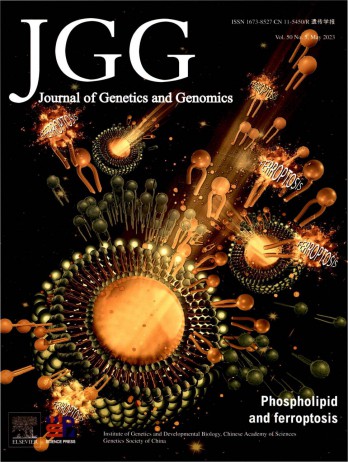Journal of Genetics and Genomics杂志论文格式要求:
Title page
Include the following information on this page:
• Title The full manuscript title should be succinct, informative and descriptive. The title should include detail for indexing and should be comprehensible for a broad scientific audience. Authors should avoid using nonstandard abbreviations in titles. The title must mention the subject organism (or general group in the case of comparative work). Latin names should be used for all organisms, while common names are allowed for the model systems (rice, maize and yeast).
• Author affiliation Include department, institution, and complete address for each author. If there are authors with different affiliations, use superscripts to match authors with different institutions.
• Corresponding author The name, complete address, telephone and fax numbers, and e-mail address of the corresponding author should be provided.
• Manuscript information The numbers of text pages (including references and figure legends), of figures, of tables, and of words in the paper should be provided.
• Word and character counts The number of words in the abstract and the total number of characters in the paper should be provided.
• Abbreviation footnote List abbreviations in alphabetical order used five or more times . Define these where first mentioned in the text and do not use them in the title.
Abstract and keywords
The abstract should stand on its own with no reference to the text. It should contain approximately 200 words and must summarize the questions being addressed, the approach taken, the major findings, and the significance of the results. It should be concise, complete, and clearly communicate the importance of the work for a broad audience. At least three key words (for the purposes of indexing) should be supplied following the abstract.
Text
Authors should divide their manuscripts into the following sections: Introduction, Results, Discussion, and Materials and methods. Mark every section and every subsection with serial number, like 1., 2., 3., and then 1.1., 1.2., 1.3 and so on.
• Introduction The Introduction should provide the necessary background information for the average reader; it should be both complete and concise. Previous publications that form a basis for the work presented must be cited. Citation of reviews is not a substitute for citing primary research articles. Citation of recent research articles is not a substitute for citing original discoveries. An author’s own work should not be cited preferentially over equally relevant work of others.
• Results The Results should be organized using subheadings to make clear.
• Discussion The Discussion should focus on the interpretation rather than a repetition of the Results section.
• Materials and Methods Methods must be described completely enough so that other laboratories can replicate results and verify claims. Generally, standard procedures should be referenced, though significant variations should be described. Appropriate experimental design and statistical methods should be applied and described wherever necessary for proper interpretation of data and verification of claims. All novel materials and the procedures should be described in sufficient detail to allow their reproduction.
Acknowledgements
List dedications, acknowledgements and funding support.
References
Cite references in the text by name and date of publication, but not by number. Authors are expected to proofread every citation in their reference list against the PDF or photocopy of the cited work so that the reference list is accurate with respect to spellings, symbols, italics, and subscripts/superscripts. Only published or in-press papers and books may be cited in the reference list. Citations for web sites (other than for primary literature) should be handled parenthetically in the text and not included in the reference list. Authors should test all URLs and links.
It is expected that all cited publications have been read and determined to be appropriate by the authors, not merely identified by database searches. Reference to specific results should be to original research articles, not to more recent articles or reviews.
A reference manager software, Endnote, Reference Manager or other similar software, is suggested to be used. Then spelling errors and fault information can be avoided. The reference format is the same as Developmental Biology.
Journal of Genetics and Genomics杂志往年文章平均引文率
